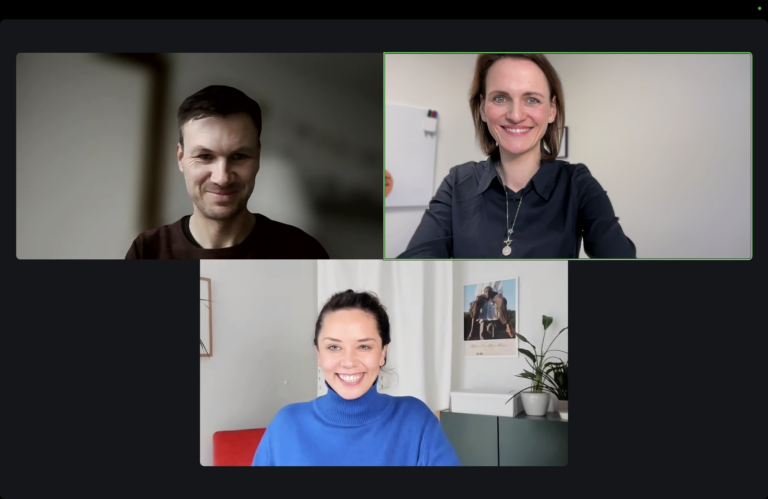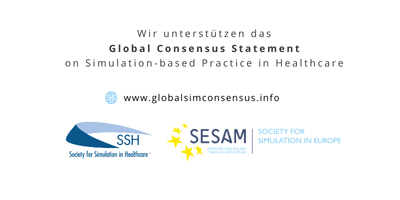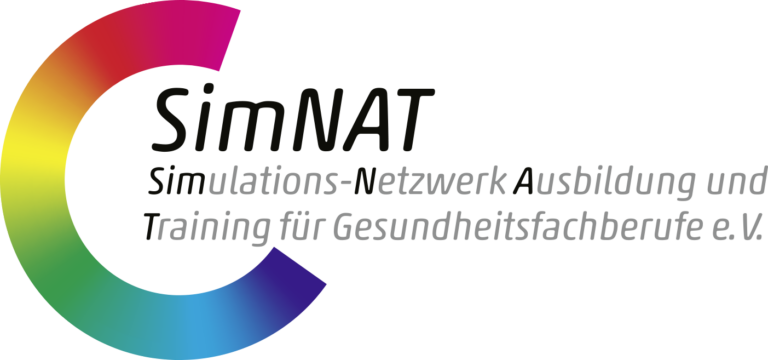News
BREAKING NEWS am Mittwoch, 06.11.2024
1. Zertifikat Basisqualifikation Simulationslernen (Instruktor:in)
https://www.linkedin.com/feed/update/urn:li:activity:7259932608493445120
Mit Stolz dürfen wir das 1. Zertifikat für den erfolgreichen Abschluss unserer Basisqualifikation Simulationslernen (Instruktor:in) verleihen! Ein großartiger Meilenstein für uns als Gründerinnen!
In 6 Modulen haben wir uns intensiv mit vielen Facetten des simulationsbasierten Lernens (SBL) beschäftigt, diskutiert, argumentiert, entwickelt, angepasst, geübt und reflektiert. Wir haben Wissen vermittelt, Kompetenzen vertieft, Denkanstöße gegeben und selbst ganz viel Feedback für die Weiterentwicklung des Kurses erhalten. DANKE dafür den Teilnehmenden!
Neben unseren synchronen Treffen in der Online-Präsenz haben die Teilnehmenden in asynchronen Phasen selbstständig weitergearbeitet und ihren Lernfortschritt in einem Portfolio festgehalten. Die O-Töne von unserem Teilnehmer Johannes bestätigen uns, dass wir mit unserem Kursangebot auf dem richtigen Weg sind:
„Mein Ziel ist es, den Raum für SBL zu erweitern und die Professionalisierung des Lernortes voranzutreiben, durch evidenzbasierte Konzepte und die Anwendung von internationalen Standards.“
„Die Auseinandersetzung mit dem Thema Emotionen hat mich bestärkt, da ich dieses auch aktuell an der […] stark in die Gespräche einbringe. Die Dimension des Themas wird aus meiner Sicht häufig unterschätzt.“
„Das Modul 3 hat mir geholfen das bestehende Template kritisch zu hinterfragen, bestehendes zu verändern.“
„Der Aspekt der psychologischen Sicherheit für SP war mit neu, bisher kannte ich diese Perspektive nur hinsichtlich der Lernenden. Dies habe ich bisher unterschätzt.“
„Die Feedbacks werden zukünftig einem Modell folgend gegeben. Ein wichtiger Aspekt ist die Gestaltung des Debriefings, die Trainer*innen sind Moderator*innen und die Reflexion steht im Fokus.“
Auch im Jahr 2025 freuen wir uns darauf, weitere Instruktor:innen auf ihrem Weg zu unterstützen, die Zukunft des simulationsbasierten Lernens in Deutschland aktiv mit zu gestalten!
BREAKING NEWS, May 24th 2024
Global consensus statement on simulation-based practice in healthcare
The international simulation community positions itself with a statement on the importance of simulation-based learning in healthcare. The statement aims to achieve a consensus on the key priorities for the widespread adoption of exemplary simulation practices that positively impact global healthcare.
Im Rahmen einer internationalen Zusammenarbeit wurde ein iterativer Konsultationsprozess mit 50 Fachgesellschaften durchgeführt, die in 67 Ländern auf sechs Kontinenten tätig sind. Diese von der Society for Simulation in Europe (SESAM) und der Society for Simulation in Healthcare (SSH) geförderte Zusammenarbeit zielt darauf ab, eine globale Perspektive auf den aktuellen Umfang der simulationsbasierten Praxis zu formulieren und einen Konsens über zukünftige Leitlinien zu erzielen. Es betont die entscheidende Rolle der Simulation bei der Verbesserung von Gesundheitspraktiken und Bildung sowie ihre weitreichenden Auswirkungen.
We at HejSim support the call to action for recognizing the benefits of simulation in education and practice.
We have summarized the key facts from the statement below.
Simulation plays a crucial role in addressing common challenges in healthcare. It improves healthcare processes and systems and significantly contributes to the development of a safety culture within organizations. It has proven to be cost-effective and successful in enhancing team performance, strengthening workforce resilience, and improving patient outcomes.
The value of healthcare simulation is immense and encompasses a wide range of tools and practices. Simulation promotes the development of communication skills, situational awareness, decision-making, teamwork, and leadership. Simulation-based learning is continuously evolving and adapting to the needs of healthcare.
However, various professions still learn in isolated silos, with insufficient opportunities for interprofessional education. These disparities lead to uneven development of competencies across all career stages. Additional challenges include a lack of standardization in simulation training programs and inadequate quality assurance of practices, particularly concerning assessment and faculty development.
The consequences of insufficient funding and resource allocation affect all healthcare systems and cultures. Ultimately, these challenges negatively impact staff, patients, and society as a whole.
A fundamental prerequisite is the promotion of equal access to high-quality healthcare, including dental, mental, and social care. Simulation complements the development and refinement of skills essential to ensuring the excellent healthcare that every individual deserves. Therefore, the global availability of healthcare simulations is an ethical imperative. This includes the commitment to and adherence to universal guidelines, such as the standards of the International Nursing Association of Clinical Simulation and Learning (INACSL), the Association for Simulated Practice in Healthcare (ASPiH), the Association of Standardized Patient Educators (ASPE), and the Code of Ethics for Healthcare Simulation (SSH).
It is crucial to promote a shared safety culture in simulation-based learning. This ensures the psychological and physical safety of all participants and eliminates the "blame and shame" feedback from the learning and operational culture. Learners should be supported in the process of experiential learning with integrity and transparency, and in accordance with best practices.
The global consensus process has generated several key themes for recommendations.
First and foremost, it is necessary to advocate for the benefits that simulation brings. It is essential to promote its adoption and integration into daily learning and practice across the spectrum of healthcare. Political, strategic, and financial support at institutional and governmental levels is crucial. Ensuring the sustainability of simulation facilities, programs, and workforce requires concerted efforts and commitment.
Key strategies for effective use of simulation-based learning from the perspective of experts include:
- The development and use of evidence-based tools to ensure the quality of healthcare practice.
- Investments in the development of educators to enhance their expertise in simulation practice.
- Evaluating simulation activities to maintain quality standards.
- Promoting research and science to advance as a community of practice.
The international simulation community recommends, among other measures, the following actions in their statement:
- Providing sustainable resources for simulation.
- Mandatory use of simulations in initial, continuing, and advanced training.
- Supplementing and/or replacing clinical experiences with high-quality simulation experiences.
- Promoting simulation as a vital and necessary learning tool in all phases and levels of healthcare careers.
- Provision of necessary resources for healthcare simulation, including personnel, equipment, and space.
- Utilization of simulations to create interprofessional education and training opportunities.
- Promotion and adherence to best practice standards.
- Promoting the qualification of educators in simulation-based learning.
For the practice community in simulation-based learning in healthcare professions, this entails:
- Simulation must be promoted as a vital learning tool.
- Best practice standards must be consistently implemented.
- Simulations must be conducted with the highest standards of personal integrity and ethical conduct.
- The willingness for lifelong learning is essential for implementing high-quality simulations.



